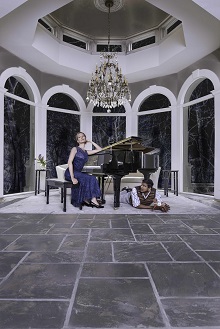 Modern Opera We’d See Again And Again
Modern Opera We’d See Again And Again
I cannot imagine a better season closer for Tapestry Opera than Rocking Horse Winner. This haunting production, based on a short story by D.H. Lawrence, will stay with you all summer, and have you waiting with bated breath for more indy and modern opera this fall.
The short story of the same name was first published in 1926, and many of the themes that were relevant to the post-war, pre-stock market crash world resonate today. Paul discovers that he can enter into a trance-like state if he rides his rocking horse late into the night, allowing him to pick winning horses. He teams up with his uncle Oscar, and his caregiver Basset and the money starts rolling in. Paul’s only desire is to win his mother, Eva’s, love and make her smile.
Eva, a distant, empty woman who “had no luck”, is so anxious about never having enough that the house itself whispers in Paul’s ear “There must be more money.” Paul exhausts himself riding his horse, but the more he makes, the more Eva spends, and it is just never enough. Librettist Anna Chatterton did an exceptional job of adapting this short story, using key lines from the original manuscript for the repetition that is characteristic of operatic arias, duets, and ensembles.
When the opera opened with the house, a living breathing entity in this work, singing a fugue, I knew that this was my kind of modern music. The score, by Gareth Williams, was beautiful and haunting, and easy to listen to. Williams’ compositional technique is inspired and thoughtful, demonstrating deft use of contrast and musical symbolism. It is no surprise that I am literally salivating over Williams’ score – he is the compositional genius behind Pub Operas which remains one of my favourite Tapestry productions to-date.
A vast array of moods and complex ideas were communicated by the gifted chamber orchestra, comprised of string quartet and piano. Sinuous lyricism was smoothly interchanged with driving, syncopated rhythms, laying bare the futility of trying to fulfill a need for meaning with uncontrolled consumption.
Asitha Tennekoon’s fresh and free lyrical tenor voice was a delight to the ears, and perfect for the role earnest, single-minded Paul. As Paul journeyed from hope to despair, darker, weightier colours crept into Tennekoon’s tone, making every note of Paul’s heartbreaking music visceral to the listener. I was actually on the edge of my seat during his performance of the aria that I am going to name “Gets There”, where we learn of his mystical ability.
Carla Hutanen took full advantage of the crystal clarity of her voice, and the breezy spin of her high notes to step into Ava’s skin. She was cold, detached beauty personified, with seething rage bubbling up from below the surface during her scenes at the piano. Her performance of the aria that I will call “He Doesn’t Know Walls Like I Do”, and her duet with Tennekoon “Mother won’t you smile” were glorious.
Using a four-part chorus to represent the whispering house in this modern-day fairy tale was ingenious. The chorus has some show-stopping music, and the talented quartet gave the performances to match.
Directed by Tapestry’s artistic director Michael Mori, this production was stylish, and enthralling in its simplicity. The production used one set that effectively represented two locations. The ominous rocking horse loomed over the stage, empty save for a grand piano. Under a vaulted, airy ceiling, the effect screamed “house poor”, with a side of emotional void.
In Williams’ and Chatterton’s adaptation of the story, Paul is a young man on the autism spectrum, rather than a child as in the original tale. I wish I did not know this. I am no expert, but going into a trance that allows you to pick winning race horses did not seem consistent with the behaviours of an autism spectrum disorder, and autism did not read on stage. For me, this interpretation just perpetuates romanticized stereotypes of the autistic person as a savant. If the movie “Rain Man” triggers your ableism spidey sense, please forget I told you this, it is not mentioned anywhere in the opera.
There are arias, duets, and ensembles from this opera that, in my humble opinion, are destined to become part of the cannon of 21st century opera. This is a modern opera that I would see again and again, and buy a recording of to listen to when I am in the mood for a darkly beautiful blend of turbulence and lyricism.
Details:
- Rocking Horse Winner is playing until June 4 at Berkley Street Theatre, (26 Berkely Street, Toronto, ON )
- Show times are May 28, 31, June 2, 3 & 4 at 8:00 PM, with an additional matinee on May 29 at 4:00 PM
- Ticket prices range from $27-112.
- Tickets are available online, or through the box office at 416.368.3110
